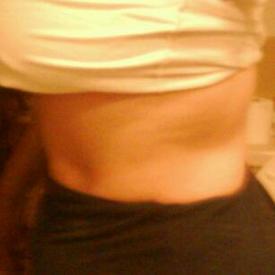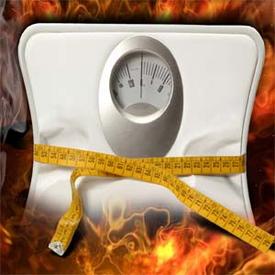I don't know how I should do this...
Options

Broejen
Posts: 414 Member
At 5'2", 187lbs, 37 years old, I figured my BMR is 1580 using the Scooby calculator. I thought I should stick to eating that and eating back my exercise calories, but maybe I should be eating my TDEE-20%? Right now I am exercising about 30 min. 4 times a week which would make that 1717. I know the deficit should be low, but I really don't want to lose only a few pounds a month. Is there any way to make the deficit more without eating below my BMR? I exercised an hour yesterday and ate maybe 60cal more than my BMR, but my FitBit said I only burned 2113, so the deficit was only 164! (1640 + 309 from exercise = 1949). Is my math wrong somewhere?
0
Replies
-
At 5'2", 187lbs, 37 years old, I figured my BMR is 1580 using the Scooby calculator. I thought I should stick to eating that and eating back my exercise calories, but maybe I should be eating my TDEE-20%? Right now I am exercising about 30 min. 4 times a week which would make that 1717. I know the deficit should be low, but I really don't want to lose only a few pounds a month. Is there any way to make the deficit more without eating below my BMR? I exercised an hour yesterday and ate maybe 60cal more than my BMR, but my FitBit said I only burned 2113, so the deficit was only 164! (1640 + 309 from exercise = 1949). Is my math wrong somewhere?
You say " I know the deficit should be low, but I really don't want to lose only a few pounds a month"
I am not sure what you are expecting from EM2WL What is your weight loss goal? Just curious.0 -
I'm used to losing an average of 6lbs per month, but 3-4 would be fine. I want to get down to 150, but for my size I think I'm supposed to be around 125. Aside from me losing, does the math and amount eaten sound right?0
-
I'm used to losing an average of 6lbs per month, but 3-4 would be fine. I want to get down to 150, but for my size I think I'm supposed to be around 125. Aside from me losing, does the math and amount eaten sound right?
1-3 hours of exercise a week is lightly active and I think the factor is I.35. ( check me on that). Multiply your BMR x 1.35 = TDEE.
If your BMR is 1580 then your TDEE is 2133. If you wanted to lose 2 pounds per week that is a deficit of 1000 cal per day or a TDEE cut at 1133.........too low. A cut of 15% (320 cal per day) is 1813 calories. That is slightly less than 1 pound per week. 20% is 1706 or 427 calories cut per day. That is closer to 1 pound per week or 4 per month. At a TDEE of 2133 you would not eat back your exercise calories. If you exercise 3 or more hours per week you will have to recalculate your TDEE.
It is recommended to only cut 15% of TDEE. That is why I asked how much you wanted to lose. This is not a fast process, but a healthy one.0 -
So what would you recommend I do, eat my BMR and any exercise calories, or eat my TDEE-15%? What if I don't find out until the end of the week that I exercised moderately? I don't usually plan out my exercising since walking depends on the weather. I could go for an hour walk outside, but at our rec centre where they have a walking track, I can only stand about a half an hour.
Also, if I do eat at TDEE-20%, my exercise is built in right, so as long as I stick to the level of exercise that the TDEE was calculated with, I shouldn't have to worry about eating below my BMR?0 -
Also, if I do eat at TDEE-20%, my exercise is built in right, so as long as I stick to the level of exercise that the TDEE was calculated with, I shouldn't have to worry about eating below my BMR?
^^This. I'm curious about this, too. I've been trying to figure out how to get myself out of a long plateau, and I've been reading so much about BMR/TDEE/net cals/gross cals, etc, for so long, I feel like I'm starting to get it all confused. Since TDEE includes your BMR cals, if you're basing the (reasonable) cut on TDEE, you shouldn't be eating below your BMR, yes?0 -
I have my goals set just slightly above my BMR & eat back all my exercise calories. I've lost about 18 lbs & never feel hungry. I eat what I want when I want with reasonable portions. Hope this helps.0
-
I have my goals set just slightly above my BMR & eat back all my exercise calories. I've lost about 18 lbs & never feel hungry. I eat what I want when I want with reasonable portions. Hope this helps.
I was thinking that would probably be easier since the cut is so close to my BMR, I'd have to watch it to make sure I always net above it anyway. As well, then I can do my own thing and not worry about if I'm moderate activity or light.0 -
I have my goals set just slightly above my BMR & eat back all my exercise calories. I've lost about 18 lbs & never feel hungry. I eat what I want when I want with reasonable portions. Hope this helps.
I was thinking that would probably be easier since the cut is so close to my BMR, I'd have to watch it to make sure I always net above it anyway. As well, then I can do my own thing and not worry about if I'm moderate activity or light.
You could keep your TDEE at lightly active (1.35 factor). If you exercise more than 3 hours per week eat those burned calories back. But you are correct you want to net above your BMR as a minimum.0 -
I have my goals set just slightly above my BMR & eat back all my exercise calories. I've lost about 18 lbs & never feel hungry. I eat what I want when I want with reasonable portions. Hope this helps.
I was thinking that would probably be easier since the cut is so close to my BMR, I'd have to watch it to make sure I always net above it anyway. As well, then I can do my own thing and not worry about if I'm moderate activity or light.
Except for the days you miss doing a planned workout, you'll find it probably works out to be about the same.
To create a bigger TDEE to allow more deficit, you need to move more, simple.
Now, your FitBit may be wrong on the calories for it's TDEE if you are doing a workout it can't accurately track.
Outside of the possibility, you are being given a TDEE you can easily avg out then, even picking your non-exercise days and averaging many of them.
Take 15% off that non-exercise TDEE, then eat your exercise calories back - minus the same 15% of course.0 -
Except for the days you miss doing a planned workout, you'll find it probably works out to be about the same.
To create a bigger TDEE to allow more deficit, you need to move more, simple.
Now, your FitBit may be wrong on the calories for it's TDEE if you are doing a workout it can't accurately track.
Outside of the possibility, you are being given a TDEE you can easily avg out then, even picking your non-exercise days and averaging many of them.
Take 15% off that non-exercise TDEE, then eat your exercise calories back - minus the same 15% of course.
I don't really plan workouts. I just go when I can. My main exercise is walking, so the FitBit would count that pretty accurately I hope.
My TDEE with no exercise is 1903 by Fat2Fit, which I think is pretty accurate looking at my FitBit on the days I don't do much. 15% off of that is 1617 which is pretty darn close to my BMR. I think as long as I net around 1600 I'll be okay, right?0 -
I don't really plan workouts. I just go when I can. My main exercise is walking, so the FitBit would count that pretty accurately I hope.
My TDEE with no exercise is 1903 by Fat2Fit, which I think is pretty accurate looking at my FitBit on the days I don't do much. 15% off of that is 1617 which is pretty darn close to my BMR. I think as long as I net around 1600 I'll be okay, right?
That would be the more accurate TDEE figure from the FitBit, as many non-exercise days averaged together as you can get.
Take that TDEE figure divided by MFP's BMR in Apps - BMR calc.
That multiplier can dictate your selection of MFP activity level.
Sedentary - 1.25
Lightly Active - 1.35
Active - 1.45
Pick the level closest to that multiplier.
Now say maintain as weight loss goal.
Now go manually set your eating goal to that same TDEE - 15%.
Now when you walk, your FitBit sync will see the higher TDEE burn for the day compared to expected, and you'll be give credit calories added on to your manually set goal.0 -
Now say maintain as weight loss goal.
How do I do that?
So now MFP says I burn about 2000 calories a day and my goal is 1617. Is that right?0 -
Take 15% off that non-exercise TDEE, then eat your exercise calories back - minus the same 15% of course.
[/quote]
It all makes sense to me now. Thank you!0 -
Now say maintain as weight loss goal.
How do I do that?
So now MFP says I burn about 2000 calories a day and my goal is 1617. Is that right?
On that Settings - Diet/Fitness Profile where you already selected the other activity level, it says Weight Loss goal, select Maintain.
Since the closest you could get MFP to your FitBit is 100 calories over, that means you would have to do 100 calories worth of exercise before MFP even recognizes the need to increase your calories.
So I'd round your eating goal to 1650 to somewhat balance out undereating.
So the only changes you'll need to make in the future is manually changing your eating goal as weight drops.
MFP will take care of the TDEE part automatically, as long as you enter weight loss on MFP and FitBit site. That multiplier will stay about the same.
But perhaps once a month, average 3-5 days of FitBit non-exercise day TDEE and confirm MFP is close on the Goals page, and then take your 15% off that new figure.0 -
So with the way it is set now, I do NOT log exercise calories, right? Unless I net below my BMR of 1580?
Thanks so much for helping me guys, I think (hope!) that I have it down now. 0
0 -
if you are losing more than 1lb a week, not including any 'water' then you're losing fat and muscle too. if we want to only lose fat we have to eat healthy and lose it nice and slow so it stays gone.0
-
I'd like to toss out one more idea to help you figure out how many calories to eat.
Here is a link to a spreadsheet that heybales created. It is currently my "go to" place to determine calorie consumption as it takes body size (estimated body fat) into account:
https://docs.google.com/spreadsheet/ccc?key=0Amt7QBR9-c6MdGVTbGswLUUzUHNVVUlNSW9wZWloeUE
And here is his post explaining how to use the spreadsheet:
http://www.myfitnesspal.com/topics/show/717858-spreadsheet-bmr-tdee-and-deficit-calcs-macros-hrm
Of course, any calorie estimator is only as good as the info we plug into it. And even then, it's not going to be exact. My Fitbit thinks I've climbed a flight of stairs every day for the past four days ... which just isn't true.
That said, the info I've plugged into the spreadsheet gives me a TDEE that is darn close to the calories I'm burning according to my Fitbit. I only have 7 days worth of Fitbit data, which isn't much to go by. But in the past 7 days my Fitbit says I'm burning an average of 2030 calories a day and the numbers from the spreadsheet estimate my burn at 1940. That is less than a 5% difference, which I think is pretty cool. Together, they give me a good idea of what I'm burning and how much I should be eating.0 -
So with the way it is set now, I do NOT log exercise calories, right? Unless I net below my BMR of 1580?
Thanks so much for helping me guys, I think (hope!) that I have it down now.
Well, using this method you'll receive FitBit adjustments when your daily activity is more than your avg non-exercise TDEE. So to keep the same deficit amount, you eat those back. That will automatically keep you above BMR.
You could name those adjustments for what you know it was, for record keeping.
I actually preferred logging the workout and calories in the Food Diary log, much easier to review info.0 -
Well, using this method you'll receive FitBit adjustments when your daily activity is more than your avg non-exercise TDEE. So to keep the same deficit amount, you eat those back. That will automatically keep you above BMR.
You could name those adjustments for what you know it was, for record keeping.
I actually preferred logging the workout and calories in the Food Diary log, much easier to review info.
Thanks, got it! 0
0
This discussion has been closed.






